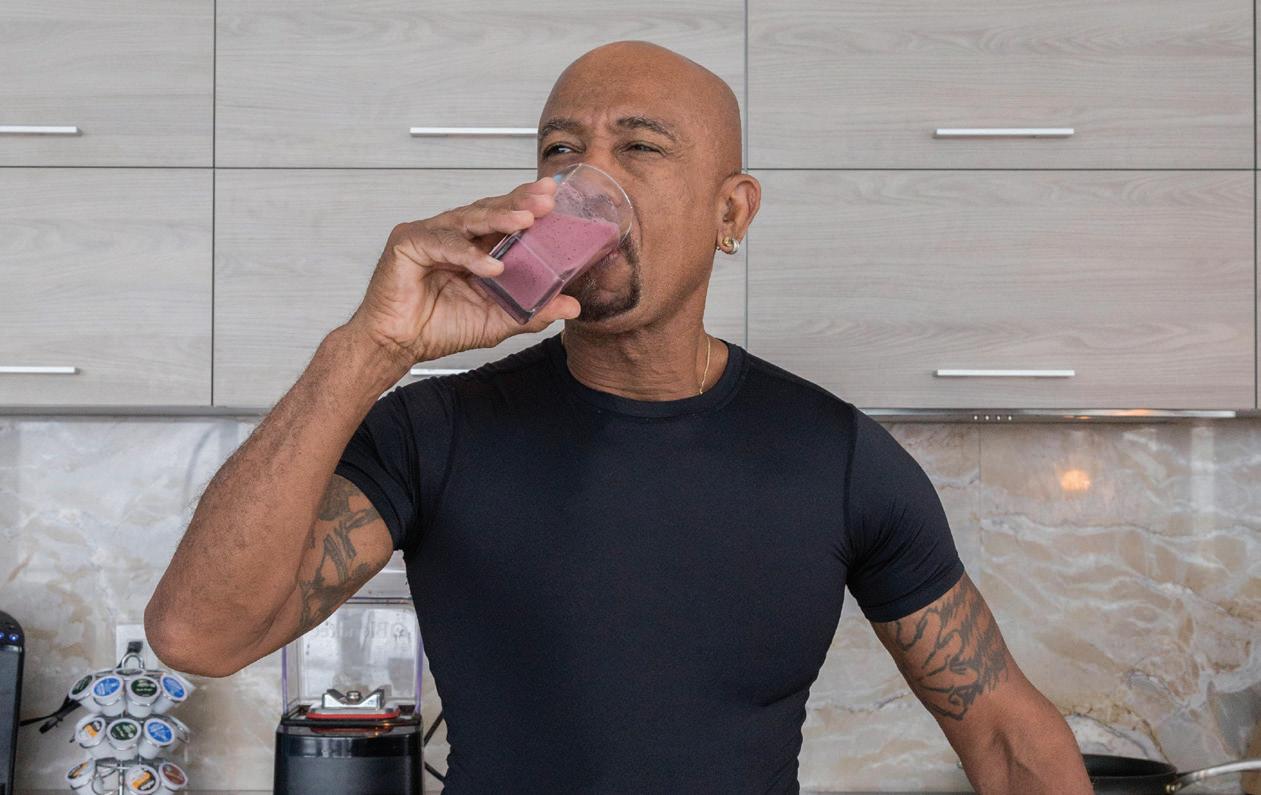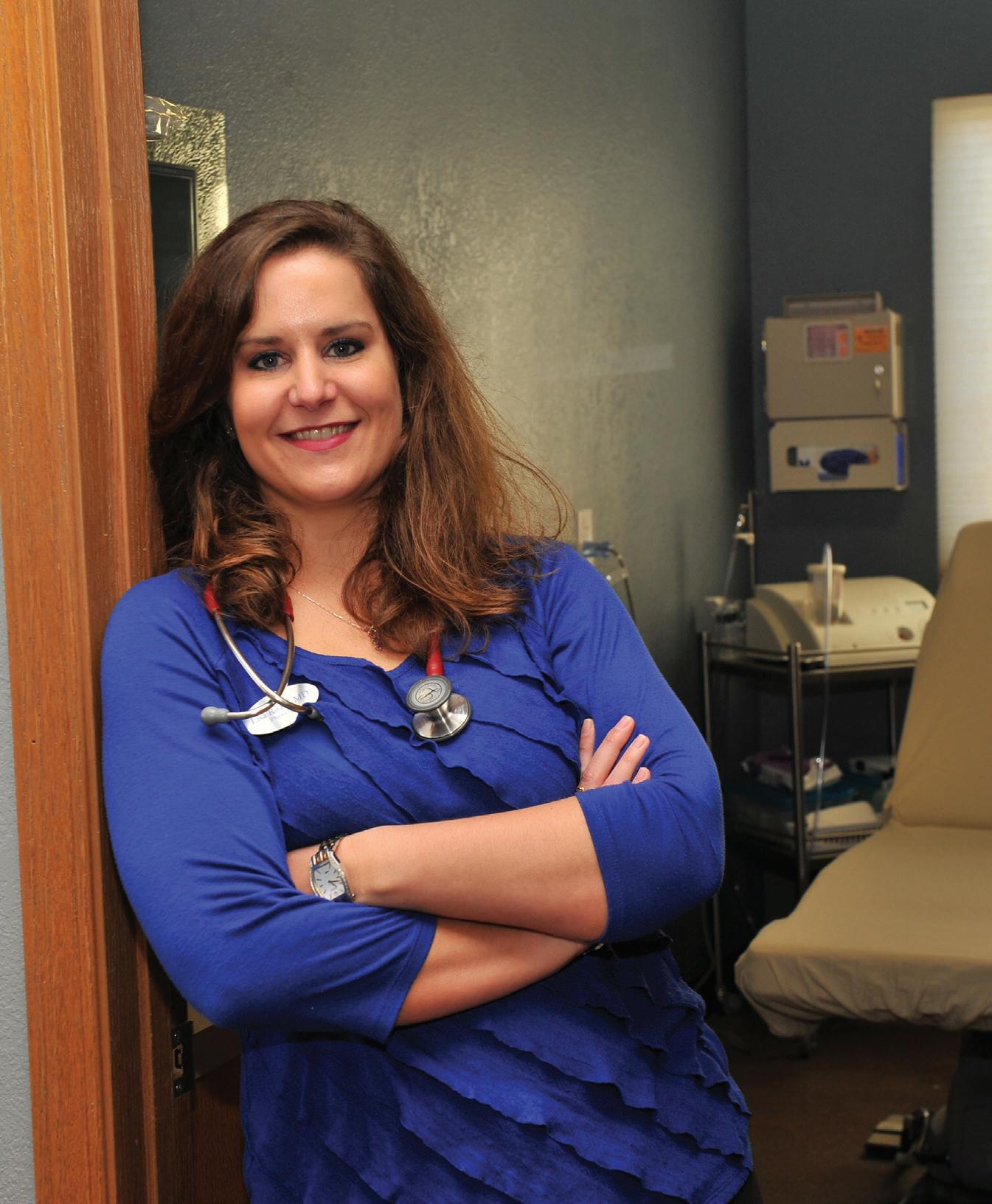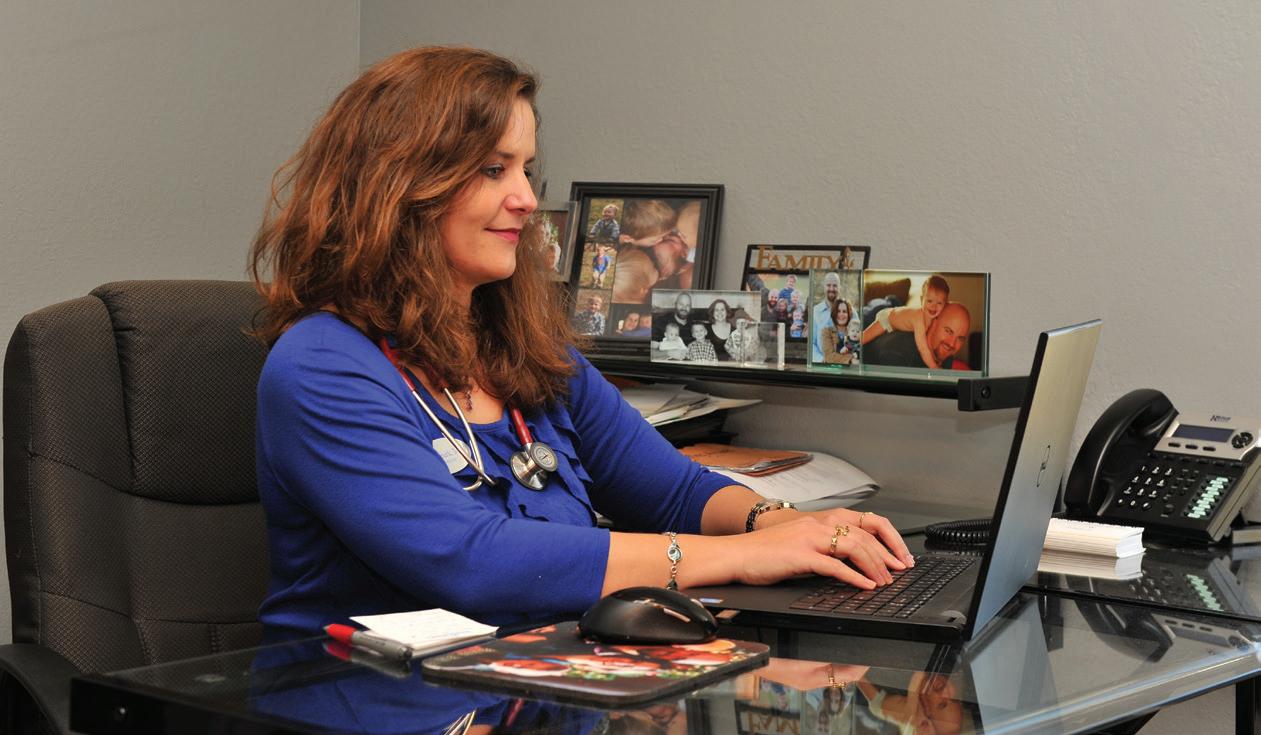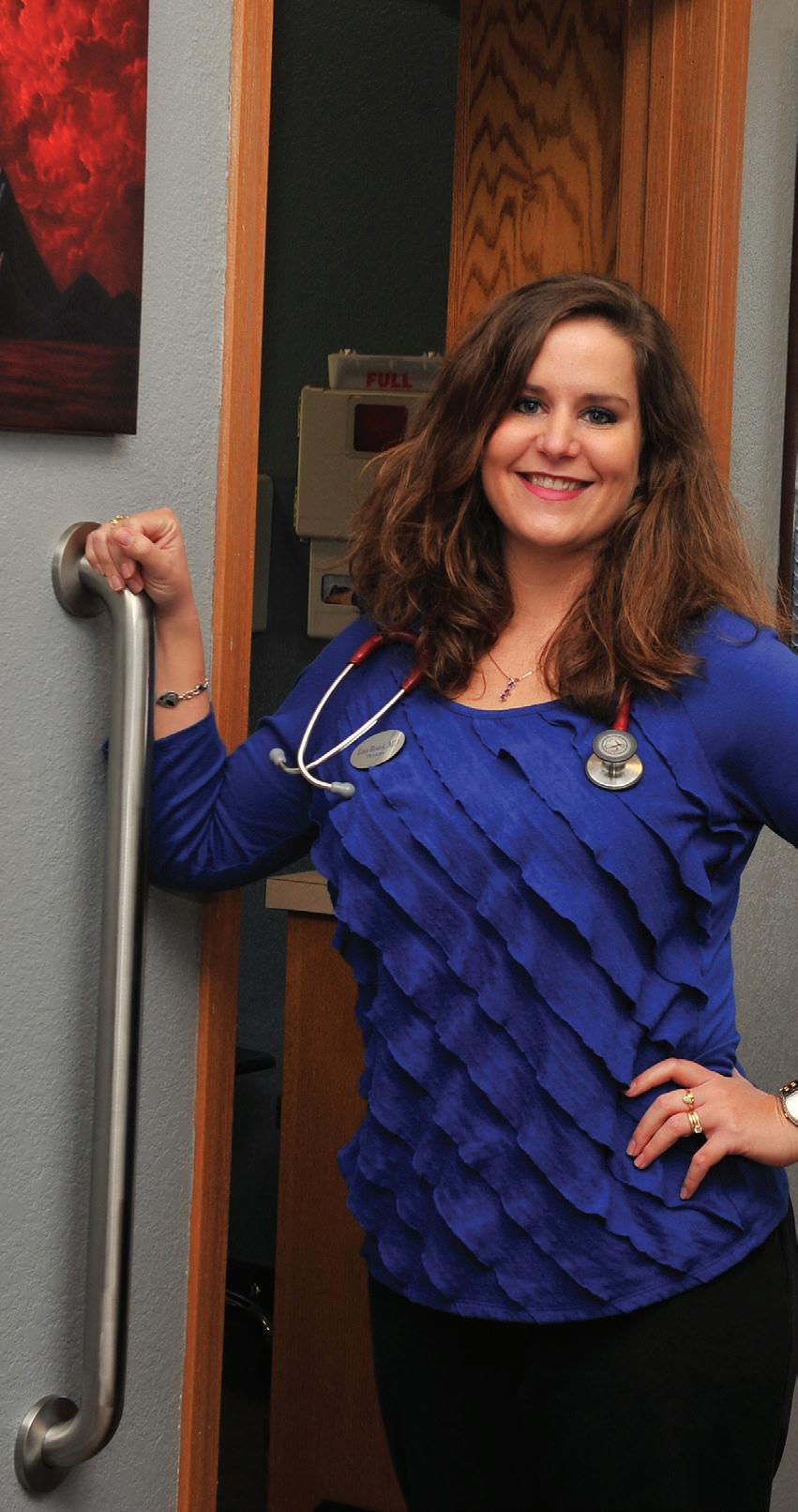
21 minute read
WITH NURSE JORDAN NATURAL PLANT MEDICINE
BY HEATHER DEROSE PLANT MEDICINE POWERFUL PLANTS FOR MS
Cannabis is a powerful plant medicine that has been shown to help MS patients, but it’s not the only tool in the toolbox. There are several plants shown to produce anti-inflammatory effects, which can be beneficial to help reduce symptoms like fatigue, muscle pain and stiffness, spasms, improve sleep quality, and improve depression. Obtaining phytonutrients from plants can help improve the quality of life for those living with MS. Most strategies for the treatment of MS focus on reducing inflammation within the central nervous system.
Advertisement
Many plants offer benefits without the side effects associated with synthetic treatment options and can effectively help patients. Ginkgo is among the oldest living tree species in the world and has been found to reduce fatigue in some MS patients. 1 Vitamin D has sufficient evidence to support its use with patients living with MS. 2 Vitamin D is a nutrient found in some foods, it helps nerves to transmit messages between the brain and the entire body. 3 Another powerful plant is green tea. Green tea polyphenols are antioxidants and contain both anti-cancer and anti-inflammatory effects. 4 Saffron has been shown to reduce oxidative stress in MS patients and has pharmacological effects such as antioxidant, anti-inflammatory and neuroprotective properties. 5
Many patients living with MS develop depression. Studies have shown herbal remedies, such as saffron, have positive effects on relieving depressive symptoms and may be an alternative to synthetic antidepressants. 6 Another plant medicine is psilocybin, which a growing number of cities in the U.S. are decriminalizing, and it’s being studied at John’s Hopkins. In January, a UK pharmaceutical company announced it received a U.S. patent for a “preparation of psilocybin” in the treatment of depression. 7
Another plant medicine shown to improve the quality of life in MS patients is evening primrose oil. The oil contains the fatty acid, gamma-linolenic acid (GLA), and has been shown to improve cognitive function, vitally and overall life satisfaction. MS patients who have used evening primrose oil have shown improved quality of life and reduced fatigue, although it did not prevent the progression of the disease. One study indicated that MS patients may find relief from fatigue and positively improve their quality of life with ginseng as well. 8

Utilizing plant medicines may provide less undesirable side effects and produce more therapeutic benefits to patients with MS. Many patients are finding relief when they reduce processed foods and incorporate more plant-based foods which offer anti-inflammatory benefits, like fruits and vegetables. The potential benefits of natural antioxidants found in food, on neurodegenerative diseases, and the roles they perform have been evaluated and may be effective at reducing oxidative stress in individuals. 9 Many individuals experience symptoms that may be treated and prevented by utilizing plant medicines and plant foods to obtain these nutrients. With most strategies of treatment focusing on reducing inflammation, plants may provide relief without the list of negative side effects from synthetic medication.
MONTEL WILLIAMS
GETS BLUNT WITH GRAM

BY HEATHER DEROSE
The GRAM team was inspired after seeing Montel Williams’ powerful keynote presentation at the Cannabis Science Conference last year. The Emmy Award winning television star, decorated veteran, and fitness enthusiast was diagnosed with MS (multiple sclerosis) in 1999. Montel explains, “I had been trying opioids for about a year and a half, and they weren't really giving me sufficient relief.” His doctor then gave him a recommendation for cannabis. “I think when the doctor first recommended it, I really didn't understand the full research and medical implications of cannabis. I literally dug in and tried to see if I could find some printed materials. Back then the internet wasn't as robust as it is today, so, it took a long time searching and finding information. But even back in 2000 and 2001, I was starting to get information that was coincident with the information that's in our government’s own patent for cannabinoids which identifies cannabinoids as having anti-inflammatory properties. Recognizing the fact that inflammation is one of the biggest nemeses of MS, I decided to see if I could gain any anti-inflammatory relief from using cannabis and did so really first kind of trying it to see if I got anything out of it. I'd also been down a pretty heavy pathway of opioid prescriptions. I had doctors who were willing to write me prescription after prescription after prescription of opioids, and I wanted to see if I could break that cycle. It really helped me break that cycle.”

Montel tells us how he went ahead with his recommendation and sought out cannabis to try and find a couple strains. However, this wasn’t Montel’s first experience with cannabis. “I used cannabis when I was in high school. I'm a child of the 70’s, so cannabis was around, and I probably used it, I would say back then recreationally, but not on a regular basis. I had gone away from cannabis for almost 20 years because of my time in the military. So, when I started using it again on a regular basis, I'd already started my career in Hollywood and been to a couple of parties where cannabis was available.” He says, even then, he was only an every other month type of consumer. He explains how after reading the literature and learning it works better when you use it consistently and on a regular basis, he started a more consistent routine. “I started doing so and after about only two months, I started getting more relief.” “Early on, I found that using the higher CBD, the more relief I started getting. But then, I started noticing that after, I'd say about two years, I started noticing that I needed to include some THC and that and the fuller spectrum, the better the relief. So for me, I now use varied forms throughout the day. I use a higher THC in the mornings to start my day, and I shift over to a higher CBD in the evening.” He explains although
he’s used cannabis and been an activist for over two decades, he has been a non-flower consumer for a couple decades. “I have been a non-flower user for almost 20 years, and I shifted over to using kief in about 2001, long before it was vogue. I found that, for me, I get better relief out of kief than I do out of flower. So, I've kind of shifted away from flower, but on some rare occasions I now use flower. I like to mix kief with flower to give a broader spectrum.” Montel explains how he’s not only found cannabis benefits his MS, but he’s found benefits in the gym, in addition to restful recovery after training sessions. "I definitely, for close to 20 years, I have used cannabis before workouts. Number one, I think some of the relief I've gotten out of it is there's less joint pain and less amount of post-workout tension. So, it's an easier way to relax and calm down. I also use it for sleep.” Although he consumes cannabis for many beneficial reasons, he explains how it can be considered a powerful tool in the toolbox for health. “I think that no one should look at cannabis as if it is the end to all. It's just like when we go to war, a war uses multiple branches of the service, Army, Navy, Air Force, Marine Corps. We fill our quiver of weaponry with every weapon we can utilize to the best advantage for whatever it is that we're trying to overcome. Cannabis is just another arrow in that quiver. It's another weapon in the arsenal that should be looked at being used and respected, when it actually has an effect that is giving people relief.” After Montel’s diagnosis, he has researched extensively other ways to help fight against MS and found that cannabis isn’t the only plant medicine that could help. “I tried my best to seek out a diet that was more filled with anti-inflammatory foods. I eat a lot of fruits and vegetables and try to reduce my intake of processed foods.” Food is medicine and many fruits and vegetables provide other health benefits in addition to their anti-inflammatory properties. Montel Williams was one of the first people to step out back in 2001 and openly discuss his cannabis use as it related MS. “People thought I was crazy for having even acknowledged the fact that I was doing so [using cannabis], and I didn't get the support that we have right now. In the last three years, everything has changed. But before that, people really looked at it like a joke. Oh, yeah right. You use it for ‘medicine.’ The truth of the matter is, yes, I was, I was doing exactly what the U.S. government was doing back then.

Nobody was willing to discuss it. I'm glad that now the industry and attitudes in the country are starting to change, but people have to remember, 18 years ago, it was entirely different.” One discovery that has been hypocritical to the scheduling of cannabis in the United States is the patent 6630507 that the government has held since 2003 on cannabinoids. Montel says, “When I read that the U.S. government literally gave itself a patent for research that it did that proves the anti-inflammatory properties of cannabis, that changed my mind immediately. I really would suggest people take the time to pull up the U.S. patent 6630507. All you have to do is read what our government says. We believe them when it comes to so many other things, we should be believing them when it comes to the money that we've spent taxpayer dollars to research and come up with discoveries. Why not believe it when the government itself has a patent? If the United States government has written out specific properties that it believes cannabinoids have, and it has done so. It states unequivocally, ‘Cannabinoids have been found to have antioxidant properties unrelated to NMDA receptor antagonism. This newfound property makes cannabinoids useful for the treatment and prophylaxis of a wide variety of oxidation associated diseases, such as ischemic, age-related, inflammatory and autoimmune diseases. The cannabinoids are found to have particular applications as neuroprotectants, for example in limiting neurological damage following ischemic insults, such as stroke and trauma, or in the treatment of neurodegenerative diseases, such as Alzheimer's
disease, Parkinson's disease and HIV dementia. Non-psychoactive cannabinoids, such as cannabidiol, are particularly advantageous to use because they avoid toxicity that is encountered with psychoactive cannabinoids at high doses.’ There are so many elected officials who will stand on television and lie right through their teeth, not acknowledging the fact that it was Congress and the Senate that paid for the research that came up with this.” Montel suffered a rare stroke in 2018 and is lucky to have survived. He has since undergone physical therapy recovery. There are only 13 ambulances in the U.S. equipped with certain technology to access stroke patients and one of them was only 2 blocks from where he suffered his rare form of stroke. Knowing about the neuroprotectant properties and other benefits of cannabis, he believes there may be a connection between his survival and recovery and his cannabis use. Montel is well known for his accomplishments in the military and feels that veterans should absolutely have access to cannabis as an option. “The VA will not deny veterans their rights at the VA hospital if they actually are found to have used cannabis, but the hospitals still will not allow doctors to recommend or discuss. I think it's absolutely absurd that we have something that is here, that we know not only works for anti-in
flammation, but we have now seen studies that have come out talking about its effect over PTSD and other things. So there's no reason why we shouldn't allow those who do so much for us to get the minimal benefits from a medication that does no harm.” After seeing the potential of cannabis as medicine firsthand and understanding the uses of industrial hemp, Montel knows the plant has the power to improve so many lives around the world. He continues his journey to educate the world about the plant and to share the knowledge he’s gained along his path to help others. “I have a brand of cannabis that I've had in the marketplace, that I intend to reintroduce in the market in the next couple of months and have been working diligently and trying my best to produce the safest and most efficacious medicine that I can.” He’s also continuing his mission to share education with those about cannabis through his podcast, Let’s Be Blunt with Montel. He interviews a wide variety of people to discuss their knowledge about cannabis, to share his message, and educate others about a plant that was so deeply ingrained in our history for centuries, until the 1930’s. “I really think that the cat is way out of the bag. I mean, we’re down the road now where the only thing that really should be being done is more research to validate the efficaciousness of this plant rather than people trying to do research to see if they can knock down the plant. They should be trying to do research to see what benefits we can get out of it and pursue ensuring that people have access to the most beneficial properties of cannabis. I think the only reason why we don't do that is because of its impact. We’ve seen data come out recently about the fact that now, millennials and xennials seem to be gravitating more towards cannabis than they are alcohol. It's really pissing off an entire industry that really is going to fight the fight, hook and nail. They're going to fight as hard as they can to ensure that they can vilify this so that their industry is not hurt financially, and it's really ridiculous. I think now people should step up to the plate and honestly support something that if you take a look back in history, the number of deaths, suicides, injuries and look at the adverse effects of alcohol on societies worldwide for thousands of years, and you take a look at the adverse effects of cannabis, you find none. No one has died from an overdose of cannabis. Recently, there has been a reported death by a person who was using cannabis that may have been fungus related, but they didn't die because of the cannabis or cannabinoids. So why are we not trying to push more people to use a product that is less detrimental to mankind?”
I REALLY WOULD SUGGEST PEOPLE TAKE THE TIME TO PULL UP THE U.S. PATENT 6630507. ALL YOU HAVE TO DO IS READ WHAT OUR GOVERNMENT SAYS. US PATENT NO. 6630507 The government of the United States is the owner of this patent for: Cannabinoids as antioxidants and neuroprotectant
Abstract Cannabinoids have been found to have antioxidant properties, unrelated to NMDA receptor antagonism. This new found property makes cannabinoids useful in the treatment and prophylaxis of wide variety of oxidation associated diseases, such as ischemic, age-related, inflammatory and autoimmune diseases. The cannabinoids are found to have particular application as neuroprotectants, for example in limiting neurological damage following ischemic insults, such as stroke and trauma, or in the treatment of neurodegenerative diseases, such as Alzheimer's disease, Parkinson's disease and HIV dementia. Nonpsychoactive cannabinoids, such as cannabidoil, are particularly advantageous to use because they avoid toxicity that is encountered with psychoactive cannabinoids at high doses useful in the method of the present invention. A particular disclosed class of cannabinoids useful as neuroprotective antioxidants is formula (I) wherein the R group is independently selected from the group consisting of H, CH.sub.3, and COCH.sub.3. ##STR1##
DR. LISA ROARK

BY ANTONIO DEROSE PHYSICIAN SHARES ABOUT MS DIAGNOSIS
Missouri officially legalized medical cannabis in November 2018, with the passing of Amendment 2. The state first started accepting applications from qualifying patients and caregivers for medical cannabis cards on June 28th, 2019. Since then, the state’s list of registered medical patients has quickly grown into the tens of thousands, with the approval of qualified recommending physicians, like Missouri’s own, Dr. Lisa Roark. Her clinic, Roark Family Medicine, was the first in the state to offer telehealth options, where patients could meet with her office remotely. Because of this, Lisa quickly became one of Missouri’s leading recommending physicians.
“We were the first clinic to offer telehealth in Missouri, so we became very busy, very fast. I already had a full patient panel, so I had to do a lot of scheduling adjustments, work more hours, and adjust as needed.” It was during this exciting time of growth and expansion when Lisa was officially diagnosed with multiple sclerosis, which she first shared publicly on social media in October of last year. “For my birthday, I got a diagnosis. I have multiple sclerosis. I’ll follow up at Barnes next week to discuss options to help with my vision. Sucky birthday present, but better than not knowing.”
She may have MS, but she’s not letting it stop her, and she’s grateful for the incredible support she continues to receive. Lisa is a local doctor, with local values. Raised in Exeter, MO, she graduated from Exeter High School before moving to Kansas City, MO, where she completed her medical training at the University of Missouri-Kansas City School of Medicine. Afterwards, she completed her medical residency at Cox Family Medicine Residency in Springfield, MO, where she trained in all areas of primary care, including obstetrics, pediatrics, chronic illness management, women’s health, geriatrics, and many outpatient procedures.
Now she lives on a small farm with ties at school. I didn’t get to take them to school or pick them up, and had absolutely no community involvement. Now my office is one block from the school. I can walk up the street and have lunch with my kids, or they can even walk to the clinic after school. I also enjoy how much time I get to spend with my patients. As a Direct Primary Care practice, I have no billing/ insurance/coding and can spend significantly more time with my patients.”
her husband and four children in Cassville, MO, where Lisa tells us they “Enjoy spending time outside tending to the animals, gardening, hunting, playing and making memories. We are fortunate to have a large number of family members in the Cassville area.” This is also where her practice is located, which she loves for many reasons. “I love taking care of entire families, from babies to great-grandparents. It is very fulfilling to not just know a single patient, but to also understand their home and family dynamics. Family practice allows me to know my patient as a person, not just a body. I also love that I actually have time for my family and community. I worked several years for a large health system, got paid well, but missed my kid’s parLisa was inspired to become a physician by her role as a middle child and problem solver in her family. “This led me to medicine in general. I view most medical cases as a jigsaw puzzle, and I just have to figure out how to put it back together.” This passion for helping solve medical problems for her patients lead to her becoming a recommending physician in Missouri’s new medical program. “Prior to Amendment 2 making it on the ballot in Missouri, I had a patient ask me to help treat her child’s seizure disorder with CBD.I had to admit, I had absolutely no knowledge regarding cannabis or hemp, so I agreed to do research. The more I read, the more I realized physicians have been duped. I found significant research showing the medical benefits of cannabis and many therapeutic uses for this safe, effective plant. The more I learned, the more I wanted to know. I attended several conferences, met Dr. Sue Sisley on several occasions, did medical education credits related to cannabis, and joined several physician groups who have helped educate me, so that I can help educate patients. I became a recommending physician because I believe that all
people should have the right to utilize cannabis as medicine.”
“The process of choosing to do physician certifications was easy, the implementation not so much. With this being a new program in Missouri, I’ve had to spend more time educating patients than doing the actual certification. I try to educate them regarding the law, medical uses, as well as the process of getting their medical card. There have been A LOT of changes in our clinic in the last year.”
Lisa’s advice for other physicians in states who have yet to legalize, and those who now find themselves in newly legalized states is, “Get educated. Don’t accept what you’ve been taught or told to influence your opinion. Don’t buy into the ‘there isn’t enough research’ crap. There is a lot of research (much from Israel), you just have to read it.” She tells medical students

interested in medical cannabis to “Talk to patients. Learn how this plant has helped people for millions of years. Learn everything you can about it, and don’t forget to ask why. Why was it taken away from patients in the 1930’s? Why was it replaced with expensive, dangerous, opiate medications? And why can’t patients pick it up in a pharmacy?”
As far as her MS goes, she was reluctant to share any updates since first making the announcement last year. “Mostly because I didn’t have anything nice to say. I was formally diagnosed with multiple sclerosis in October, 2019. Since then, I’ve been on Tecfidera (crazy expensive MS med) with the hopes of keeping my disease in remission. Unfortunately, I haven’t seen any slowing in the progression (just fantastic side effects like hives, hot flashes, and heat intolerance). I’ve had steroid shots in my eye sockets, also in my eyeball, IV steroids, by mouth steroids for Trigeminal neuralgia (crazy painful). Physical therapy for weakness in my left leg, a muscle stimulator to try to keep my muscles working. I’ve only been working part time and sleeping excessively. I’ve cut out wheat, dairy, sugar and go to yoga as much as possible. I’ve been exhausted constantly, depressed, tearful and have felt hopeless,” she bravely shared, “for accountability. I choose to no longer be miserable or fearful. I have scheduled a stem cell transplant for March in Mexico. I will go through chemo, lose my hair, and Griff will have to go with me to care for me the entire month. I am hopeful this will put this monster in remission, and I will again be a functional mother, doctor, and wife. I am thankful to have a supportive family to help care for my babies, coworkers who will take
care of my patients for the month, and a husband that will hold me up when I’m ready to fall.”
In the meantime, she is including cannabis as part of her treatment plan. “I am currently using cannabis as medicine. I make a cannabis smoothie for breakfast every morning, (no THC, so no concerns about working under the influence) and then treat myself before bed. It has been immensely helpful with my pain (especially trigeminal neuralgia), muscle spasms, nausea, insomnia and anxiety. It hasn’t cured my MS but it has given mereprieve.”
In her plan to help patients by becoming a recommending physician, Lisa never imagined also becoming a patient. “I didn’t plan to get my card, due to the risk of losing my medical license, until my MS diagnosis. There isn’t really a law that physicians can’t use cannabis in Missouri. It’s really up to the state licensing board. I took a huge risk, got my card, and have been very verbal about it. I believe it takes risks, as well as people questioning the system, to make change.”

GRAM couldn’t agree more with taking risks and asking tough questions to change the system. We also believe in the power of sharing personal stories to normalize cannabis and those who consume it, and we want to give a special thank you to Dr. Lisa Roark for choosing to share her powerful story with us. From everyone at GRAM, we wish you the quickest and most healing journey.









